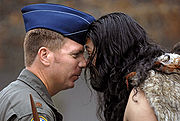
Hongi
Encyclopedia

Maori culture
Māori culture is the culture of the Māori of New Zealand, an Eastern Polynesian people, and forms a distinctive part of New Zealand culture. Within the Māori community, and to a lesser extent throughout New Zealand as a whole, the word Māoritanga is often used as an approximate synonym for Māori...
greeting
Greeting
Greeting is an act of communication in which human beings intentionally make their presence known to each other, to show attention to, and to suggest a type of relationship or social status between individuals or groups of people coming in contact with each other...
in New Zealand
New Zealand
New Zealand is an island country in the south-western Pacific Ocean comprising two main landmasses and numerous smaller islands. The country is situated some east of Australia across the Tasman Sea, and roughly south of the Pacific island nations of New Caledonia, Fiji, and Tonga...
. It is done by pressing one's nose
Human nose
The visible part of the human nose is the protruding part of the face that bears the nostrils. The shape of the nose is determined by the ethmoid bone and the nasal septum, which consists mostly of cartilage and which separates the nostrils...
and forehead (at the same time) to another person at an encounter.
It is used at traditional meetings among Māori people and on major ceremonies
Ceremony
A ceremony is an event of ritual significance, performed on a special occasion. The word may be of Etruscan origin.-Ceremonial occasions:A ceremony may mark a rite of passage in a human life, marking the significance of, for example:* birth...
and serves a similar purpose to a formal handshake
Handshake
A handshake is a short ritual in which two people grasp one of each other's like hands, in most cases accompanied by a brief up and down movement of the grasped hands.-History:...
in modern western culture, and indeed a hongi is often used in conjunction with one.
In the hongi, the ha (or breath of life), is exchanged and intermingled.
Through the exchange of this physical greeting, one is no longer considered manuhiri (visitor) but rather tangata whenua
Tangata Whenua
Tāngata whenua is a Māori term of the indigenous peoples of New Zealand and literally means "people of the land", from tāngata, 'people' and whenua land.-Meanings:...
, one of the people of the land. For the remainder of one's stay one is obliged to share in all the duties and responsibilities of the home people. In earlier times, this may have meant bearing arms in times of war, or tending crops, such as kumara (sweet potato
Sweet potato
The sweet potato is a dicotyledonous plant that belongs to the family Convolvulaceae. Its large, starchy, sweet-tasting, tuberous roots are an important root vegetable. The young leaves and shoots are sometimes eaten as greens. Of the approximately 50 genera and more than 1,000 species of...
).
When Māori greet one another by pressing noses, the tradition of sharing the breath of life is considered to have come directly from the gods.
In Māori folklore
Maori mythology
Māori mythology and Māori traditions are the two major categories into which the legends of the Māori of New Zealand may usefully be divided...
, woman was created by the gods moulding her shape out of the earth. The god Tāne
Tane
In Māori mythology, Tāne is the god of forests and of birds, and the son of Ranginui and Papatuanuku, the sky father and the earth mother, who lie in a tight embrace...
(meaning male) embraced the figure and breathed into her nostrils. She then sneezed and came to life. Her name was Hineahuone (earth formed woman).
Examples
- Performed by Hillary Clinton by a 04 November 2010 visit to Wellington New Zealand
- Performed by Ambassador of Turkey
- Performed by Prince William and Sir Paul Reeves

